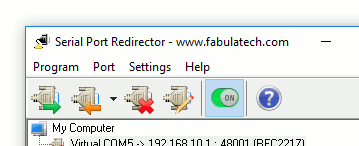Publisher's description
Serial Port Redirector is used to connect a serial application to a remote TCP socket. This allows you to utilize modern hardware COM servers without changing your software or exchange data between a TCP/IP application and an old-fashioned program that can only connect to a serial port.
Serial Port Redirector creates a two-way bridge between a serial application and a specific TCP port at a specified IP address. This is done by creating virtual COM ports. When a serial application connects to one of these COM ports, a connection is established to a specified host and all the data from the COM port gets redirected via the Internet or a Local Area Network. The program receives data from network and redirects them to virtual COM port. It works transparently for serial apps. They use virtual COM ports as if they were connected directly to your hardware devices. With Serial Port Redirector, you can easily control remote hardware COM servers via a TCP/IP network from your serial application designed to work with locally connected devices only. Now you can access a router console, work with sales terminals and barcode scanners and more.
Modern electronic instruments may not support COM ports. They are plugged into USB or network adapters and can only send/receive data via TCP/IP networks. If you wish to use your old serial applications to analyze the data or control the devices, you will need a tool like Serial Port Redirector. Serial Port Redirector is compatible with the vast majority of hardware COM servers. Moreover, it can actually enhance their functionality. Normally, hardware COM servers are equipped with some basic software applications. For example, they are usually supplied with a terminal program that uses the Telnet protocol. While this works OK in a simple interactive mode, raw data transfers get scrambled due to an incomplete protocol implementation. Serial Port Redirector solves this problem.
Serial Port Redirector creates a two-way bridge between a serial application and a specific TCP port at a specified IP address. This is done by creating virtual COM ports. When a serial application connects to one of these COM ports, a connection is established to a specified host and all the data from the COM port gets redirected via the Internet or a Local Area Network. The program receives data from network and redirects them to virtual COM port. It works transparently for serial apps. They use virtual COM ports as if they were connected directly to your hardware devices. With Serial Port Redirector, you can easily control remote hardware COM servers via a TCP/IP network from your serial application designed to work with locally connected devices only. Now you can access a router console, work with sales terminals and barcode scanners and more.
Modern electronic instruments may not support COM ports. They are plugged into USB or network adapters and can only send/receive data via TCP/IP networks. If you wish to use your old serial applications to analyze the data or control the devices, you will need a tool like Serial Port Redirector. Serial Port Redirector is compatible with the vast majority of hardware COM servers. Moreover, it can actually enhance their functionality. Normally, hardware COM servers are equipped with some basic software applications. For example, they are usually supplied with a terminal program that uses the Telnet protocol. While this works OK in a simple interactive mode, raw data transfers get scrambled due to an incomplete protocol implementation. Serial Port Redirector solves this problem.



User comments